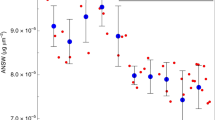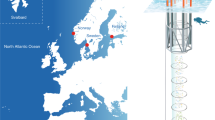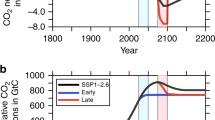Abstract
Anthropogenic CO2 emitted to the atmosphere is absorbed by the oceans, causing a progressive increase in ocean inorganic carbon concentrations and resulting in decreased water pH and calcium carbonate saturation. This phenomenon, called ocean acidification, is in addition to the warming effects of CO2 emissions. Ocean acidification has been reported to affect ocean biota, but the severity of this threat to ocean ecosystems (and humans depending on these ecosystems) is poorly understood. Here we evaluate the scale of this threat in the context of widely used representative concentration pathways (RCPs) by analysing the sensitivities of five animal taxa (corals, echinoderms, molluscs, crustaceans and fishes) to a wide range of CO2 concentrations. Corals, echinoderms and molluscs are more sensitive to RCP8.5 (936 ppm in 2100) than are crustaceans. Larval fishes may be even more sensitive than the lower invertebrates, but taxon sensitivity on evolutionary timescales remains obscure. The variety of responses within and between taxa, together with observations in mesocosms and palaeo-analogues, suggest that ocean acidification is a driver for substantial change in ocean ecosystems this century, potentially leading to long-term shifts in species composition.
This is a preview of subscription content, access via your institution
Access options
Subscribe to this journal
Receive 12 print issues and online access
$209.00 per year
only $17.42 per issue
Buy this article
- Purchase on Springer Link
- Instant access to full article PDF
Prices may be subject to local taxes which are calculated during checkout



Similar content being viewed by others
References
Moss, R. H. et al. The next generation of scenarios for climate change research and assessment. Nature 463, 747–756 (2010).
Meinshausen, M. et al. The RCP greenhouse gas concentrations and their extensions from 1765 to 2300. Climatic Change 109, 213–241 (2011).
Feely, R. A., Doney, S. C. & Cooley, S. R. Ocean acidification: Present conditions and future changes in a high-CO2 world. Oceanography 22, 36–47 (2009).
IPCC Special Report on Emissions Scenarios (Cambridge Univ. Press, 2000).
Nicholls, R. J. et al. in IPCC Climate Change 2007: Impacts, Adaptation and Vulnerability (eds Parry, M. L. et al.) Ch. 6 (Cambridge Univ. Press, 2007).
Pörtner, H. O. Climate-dependent evolution of Antarctic ectotherms: An integrative analysis. Deep-Sea Res. II 53, 1071–1104 (2006).
Pörtner, H. O. Oxygen- and capacity-limitation of thermal tolerance: A matrix for integrating climate-related stressor effects in marine ecosystems. J. Exp. Biol. 213, 881–893 (2010).
Pörtner, H. O. Integrating climate-related stressor effects on marine organisms: Unifying principles linking molecule to ecosystem-level changes. Mar. Ecol. Prog. Ser. 470, 273–290 (2012).
Pörtner, H. O., Langenbuch, M. & Michaelidis, B. Synergistic effects of temperature extremes, hypoxia, and increases in CO2 on marine animals: From Earth history to global change. J. Geophys. Res. 110, C09S10 (2005).
Melzner, F. et al. Physiological basis for high CO2 tolerance in marine ectothermic animals: Pre-adaptation through lifestyle and ontogeny? Biogeosciences 6, 2313–2331 (2009).
Widdicombe, S. & Spicer, J. Predicting the impact of ocean acidification on benthic biodiversity: What can animal physiology tell us? J. Exp. Mar. Biol. Ecol. 366, 187–197 (2008).
Pörtner, H. O. Ecosystem effects of ocean acidification in times of ocean warming: A physiologist’s view. Mar. Ecol. Prog. Ser. 373, 203–217 (2008).
Calosi, P. et al. Distribution of sea urchins living near shallow water CO2 vents is dependent upon species acid–base and ion-regulatory abilities. Mar. Pollut. Bull. http://dx.doi.org/10.1016/j.marpolbul.2012.11.040 (2013).
Seibel, B. A. & Walsh, P. J. Biological impacts of deep-sea carbon dioxide injection inferred from indices of physiological performance. J. Exp. Biol. 206, 641–650 (2003).
Sinning, A. & Hübner, C. A. Minireview: pH and synaptic transmission. FEBS Lett. 587, 1923–1928 (2013).
Reipschläger, A., Nilsson, G. E. & Pörtner, H. O. A role for adenosine in metabolic depression in the marine invertebrate Sipunculus nudus. Am. J. Physiol. 272, R350–R356 (1997).
Nilsson, G. E. et al. Near-future carbon dioxide levels alter fish behaviour by interfering with neurotransmitter function. Nature Clim. Change 2, 201–204 (2012).
Hendriks, I. E., Duarte, C. M. & Álvarez, M. Vulnerability of marine biodiversity to ocean acidification: A meta-analysis. Estuar. Coast. Shelf Sci. 86, 157–164 (2010).
Kroeker, K. J. et al. Impacts of ocean acidification on marine organisms: quantifying sensitivities and interaction with warming. Glob. Change Biol. 9, 1884–1896 (2013).
Dupont, S., Dorey, N. & Throndyke, M. What meta-analysis can tell us about vulnerability of marine biodiversity to ocean acidification? Estuar. Coast. Shelf Sci. 89, 182–185 (2010).
Dupont, S., Ortega-Martı´nez, O. & Thorndyke, M. Impact of near-future ocean acidification on echinoderms. Ecotoxicology 19, 449–462 (2010).
Caldeira, K. et al. in IPCC Carbon Dioxide Capture and Storage (eds Metz, B. et al.) Ch. 6 (Cambridge Univ. Press, 2005).
Ridgwell, A. & Schmidt, D. N. Past constraints on the vulnerability of marine calcifiers to massive carbon dioxide release. Nature Geosci. 3, 196–200 (2010).
Hönisch, B. et al. The geological record of ocean acidification. Science 335, 1058–1063 (2012).
Knoll, A., Bambach, R., Payne, J., Pruss, S. & Fischer, W. Paleophysiology and end-Permian mass extinction. Earth Planet Sci. Lett. 256, 295–313 (2007).
Kiessling, W. & Simpson, C. On the potential for ocean acidification to be a general cause of ancient reef crises. Glob. Change Biol. 17, 56–67 (2011).
Zamagni, J., Mutti, M. & Košir, A. The evolution of mid Paleocene-early Eocene coral communities: How to survive during rapid global warming. Palaeogeogr. Palaeoclimatol. Palaeoecol. 317-318, 48–65 (2012).
Kump, L. R., Bralower, T. J. & Ridgwell, A. Ocean acidification in deep time. Oceanography 22, 94–107 (2009).
Venn, A. A. et al. Impact of seawater acidification on pH at the tissue-skeleton interface and calcification in reef corals. Proc. Natl Acad. Sci. USA 110, 1634–1639 (2013).
McCulloch, M., Falter, J., Trotter, J. & Montagna, P. Coral resilience to ocean acidification and global warming through pH up-regulation. Nature Clim. Change 2, 623–627 (2012).
Miles, H., Widdicombe, S., Spicer, J. I. & Hall-Spencer, J. Effects of anthropogenic seawater acidification on acid-base balance in the sea urchin Psammechinus miliaris. Mar. Pollut. Bull. 54, 89–96 (2007).
Thomsen, J. et al. Calcifying invertebrates succeed in a naturally CO2 enriched coastal habitat but are threatened by high levels of future acidification. Biogeosciences 7, 3879–3891 (2010).
Whiteley, N. M. Physiological and ecological responses of crustaceans to ocean acidification. Mar. Ecol. Prog. Ser. 430, 257–271 (2011).
Ishimatsu, A., Hayashi, M. & Kikkawa, T. Fishes in high-CO2, acidified oceans. Mar. Ecol. Prog. Ser. 373, 295–302 (2008).
Bush, A. M. & Bambach, R. K. Paleoecologic megatrends in marine metazoa. Annu. Rev. Earth Pl. Sci. 39, 241–269 (2011).
Chen, Z-Q. & Benton, M. J. The timing and pattern of biotic recovery following the end-Permian mass extinction. Nature Geosci. 5, 375–383 (2012).
Little, C. The Terrestrial Invasion: An Ecophysiological Approach to the Origins of Land Animals 304 (Cambridge Univ. Press, 1990).
Hale, R., Calosi, P., McNeill, L., Mieszkowska, N. & Widdicombe, S. Predicted levels of future ocean acidification and temperature rise could alter community structure and biodiversity in marine benthic communities. Oikos 120, 661–674 (2011).
Kroeker, K. J., Micheli, F., Gambi, M. C. & Martz, T. R. Divergent ecosystem responses within a benthic marine community to ocean acidification. Proc. Natl Acad. Sci. USA 108, 14515–14520 (2011).
Hall-Spencer, J. M. et al. Volcanic carbon dioxide vents show ecosystem effects of ocean acidification. Nature 454, 96–99 (2008).
Fabricius, K. E. et al. Losers and winners in coral reefs acclimatized to elevated carbon dioxide concentrations. Nature Clim. Change 1, 165–169 (2011).
Parker, L. M. et al. Adult exposure influences offspring response to ocean acidification in oysters. Glob. Change Biol. 18, 82–92 (2012).
Miller, G. M., Watson, S-A., Donelson, J. M., McCormick, M. I. & Munday, P. L. Parental environment mediates impacts of increased carbon dioxide on a coral reef fish. Nature Clim. Change 2, 858–861 (2012).
Boyd, P. W. Beyond ocean acidification. Nature Geosci. 4, 273–274 (2011).
Pörtner, H. O. & Farrell, A. P. Ecology. Physiology and climate change. Science 322, 690–692 (2008).
Speijer, R. P., Scheibner, C., Stassen, P. & Morsi, A-M. M. Response of marine ecosystems to deep-time global warming: A synthesis of biotic patterns across the Paleocene–Eocene Thermal Maximum (PETM). Austrian J. Earth Sci. 105, 6–16 (2012).
Knoll, A. H., Bambach, R. K., Canfield, D. E. & Grotzinger, J. P. Comparative Earth history and late Permian mass extinction. Science 273, 452–457 (1996).
Pörtner, H. O., Langenbuch, M. & Reipschläger, A. Biological impact of elevated ocean CO2 concentrations: Lessons from animal physiology and earth history. J. Oceanogr. 60, 705–718 (2004).
Payne, J. L. & Clapham, M. E. End-Permian mass extinction in the oceans: An ancient analog for the twenty-first century? Annu. Rev. Earth Planet. Sci. 40, 89–111 (2012).
Acknowledgements
We would like to thank K. Caldeira for helpful comments on the manuscript. This study was supported by grant no. 01 LG 1005F of the Federal Ministry of Education and Research (BMBF). The authors are liable for the contents of this publication.
Author information
Authors and Affiliations
Contributions
A.C.W. surveyed the literature and analysed the data accounting for ideas by H-O.P. A.C.W. wrote a first draft of the manuscript, which was subsequently revised by both authors.
Corresponding author
Ethics declarations
Competing interests
The authors declare no competing financial interests.
Supplementary information
Rights and permissions
About this article
Cite this article
Wittmann, A., Pörtner, HO. Sensitivities of extant animal taxa to ocean acidification. Nature Clim Change 3, 995–1001 (2013). https://doi.org/10.1038/nclimate1982
Received:
Accepted:
Published:
Issue Date:
DOI: https://doi.org/10.1038/nclimate1982
This article is cited by
-
Fouling communities from the South African west coast are vulnerable to cooling and ocean acidification
Marine Biodiversity (2024)
-
Offshore extinctions: ocean acidification impacting interstitial fauna
International Journal of Environmental Science and Technology (2023)
-
Sensitivity of the grooved carpet shell clam, Ruditapes decussatus (Linnaeus, 1758), to ocean acidification
Arabian Journal of Geosciences (2023)
-
Long-term physiological responses to combined ocean acidification and warming show energetic trade-offs in an asterinid starfish
Coral Reefs (2023)
-
Impacts of ocean acidification on physiology and ecology of marine invertebrates: a comprehensive review
Aquatic Ecology (2023)



